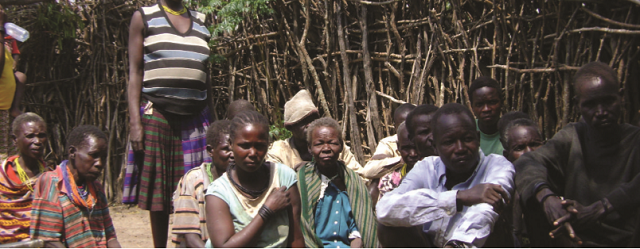
Food insecurity situation in Karamoja is of urgent concern
Kampala, Uganda | THE INDEPENDENT | United Nations agencies in Uganda on Wednesday called for relief as more than half a million people go hungry in semi-arid northeastern Uganda also known as Karamoja.
The call comes after a report, Integrated Food Security Phase Classification (IPC), issued, said the affected population goes without any food for an entire day and night for at least three days a month.
The report, compiled by the government, UN agencies and partners, shows that the number of affected people has increased to 518,000 this year, up from 361,000 people registered last year.
Marcus Prior, World Food Program (WFP) Deputy Country Director for Uganda told Xinhua in an interview that the report shows that the situation in Karamoja is significantly more serious this year than has been for the last three years.
“We are seeing sharply rising rates of malnutrition amongst children, which is most concerning, but also amongst pregnant and breastfeeding women,” Prior said.
Tim Mateeba, senior nutritionist at the ministry of health said there is need for an urgent action to prevent the region from lapsing into extremely critical acute malnutrition, which may lead to high mortality rates of children.
“What needs to be done in the short term is to first identify those children and then offer support in form of giving therapeutic foods but also treat them,” Mateeba said.
The drivers of food insecurity in semi-arid Karamoja region vary from internal to external.
The region has for decades faced persistent drought and when it rains, it floods, leading to crop failure and lack of pasture for livestock. Besides the negative impact of the COVID-19 pandemic, the region faced desert locust infestation, animal disease outbreaks, armed cattle rustling, and lately high insecurity.
Key among the external drivers is the ongoing Ukraine crisis that has pushed up commodity prices including food and fuel among others. A large part of the Karamoja population has for decades depended on humanitarian food aid, and therefore the escalation of prices is affecting the region.
“War in Ukraine is driving the food prices up and this is the real concern for us. Our concern is that by the end of the year, we will see greater spikes in food prices, which is going to affect the poorest of the poor first,” said Prior.
Prior argued that the food insecurity situation in Karamoja needs international attention, noting that it is part of the wider food insecurity faced by the Horn of Africa.
He argued that in the short term, WFP is going to scale up its nutrition program to reach all malnourished children in the targeted districts.
“We are looking at what we call a protection ratio, which means that the families of those mothers and children will receive a top-up so that the specialized food that we give to the children does not get shared out amongst the rest of the family,” Prior said.
“We are looking at the general food distributions to those in the acute phase of nutrition and hunger through the lean season,” he added.
Antonio Querido, UN Food and Agriculture Organization country representative said the agency in partnership with other relief organizations is going to implement medium and long-term measures to address the persistent food insecurity problem in Karamoja.
Querido said the agency is going to support communities with agricultural inputs to enable timely planting, and enhance agricultural extension services through the Farmer Field Schools and Agro-pastoral Farmer Field Schools.
He said there is going to be further investment in the provision of water for production.
There will also be investment in post-harvest management to reduce losses and support households to keep food stocks through the lean season, according to the UN envoy.
The UN Central Emergency Response Fund (CERF) on Tuesday allocated 4 million U.S. dollars to fight hunger in Karamoja, according to the UN Office for the Coordination of Humanitarian Affairs.
“This allocation from CERF will allow us and our partners to support nearly 300,000 people impacted by drought with food and nutrition, water, health care, child protection, and other assistance,” the office said.
*****
Xinhua
 The Independent Uganda: You get the Truth we Pay the Price
The Independent Uganda: You get the Truth we Pay the Price



